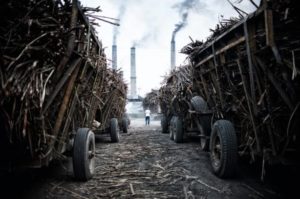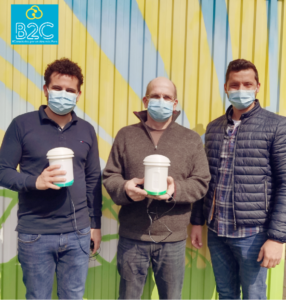Air pollution is driven by many factors. While the increase in the industrial activity and the burning of fossil fuels associated with transportation and rapid urbanization are the main concerns in developed economies, the open burning of biomass represents the highest threat in countries with developing economies based in agricultural activities [1]. In Latin America for example, the extended use of fire as a cheap and accessible tool for land clearing in either agricultural use, garbage disposal or elimination of waste represents the main concern to the environment and people’s health.
Particulate matter, a major air pollutant emitted during biomass combustion, is being increasingly associated with premature births and/or low birth weight, cognitive problems of children and the elderlies and a higher incidence of respiratory and cardiovascular diseases in the population in general [2-4]. It is estimated that over 4.2 million globally deaths were caused by ambient air pollution from fine particulate matter (PM2.5) in 2015, more premature deaths than malaria and HIV. Although there are strict laws to control and regulate the use of fire in most Latin American countries, only in Argentina more than 1.5 million hectares were burned down in 2020. Among them, a total of 95% were due to human intervention, according to a recent report by the National Fire Management Service of the Argentine government [5].
In the north region of Argentina, in the province of Tucumán for example, accidental and intentional fires are occurring more frequently in the last few years. These episodes are enhanced by climatic conditions typical of this region such as long periods with a lack of rainfall, high temperatures and strong winds.

Particulate matter emissions increase considerably in winter, not only because of fires, but also because of the high traffic of agricultural goods transports and the lack of rainfall.
Although, damage to local fauna and flora by fires can be easily observed, the air pollution produced by the regional and global transport of pollutants generated by fires cannot be assessed without the use of ground-based monitoring systems. On that note, over the last 40-50 years, high-income countries have established robust and costly systems for air quality monitoring. Nevertheless, this technology is not widely distributed, and many developing countries lack this type of stations. This leads to a lack of information to help decision makers’ work on evidence-based policies to reduce the exposure and the associated impact of air pollution on the environment and people’s health.
To fill-in the air quality monitoring gap and to build institutional systems to address this issue, the Networking initiative Breathe2Change is working to connect citizens with scientists, governmental and non-governmental institutions to create the first citizen-with-scientist powered air quality monitoring network.6 The B2C initiative is engaging the work from academic institutions in Germany (Institute for Atmospheric and Environmental Research in Wuppertal and the Technical University of Darmstadt) and Argentina (National University of Tucumán and the University Laboratory of Atmospheric Chemistry of Córdoba) to assist in the implementation of a network of 40 low-cost sensors modules to measure and deliver geo-located and real time information of particulate matter and carbon dioxide concentrations in the province of Tucumán.
“Today we have the technology at our fingertips to give citizens and their cities open access and real-time information. Thus, is possible to involve them in the process of change to improve the quality of the air they breathe.” says Ronald Borges Schiffer, M.Sc. – Mechanical Engineer of Neuer Weg project and co-creator of the low-cost monitors being employed in the B2C initiative.

Prototypes of the monitors before being installed at the air quality monitoring station of the city of Wuppertal for calibration with the assistance of Dr. Ralf Kurtenbach from the University of Wuppertal (centre), Ronald Borges Schiffer from the Neuer Weg project (left) and Dr. Rodrigo Gibilisco, Head of the B2C initiative (right).
In this sense, the sensor modules produced are delivered to be installed by citizens, with the assistance of scientist and agents of the Environmental Inspection Department of Tucumán, in the neighbourhoods most affected by the smoke produced during the fires season.
As part of the B2C initiative, a Social Lab is also carried out periodically as a meeting place for the exchange of ideas between scientists and citizens to work on the interpretation of the obtained data. Through recreational and educational activities, the aim of the Social Lab is also to promote concepts of sustainable development, environmental justice and the importance of science and citizen diplomacy in improving the quality of the air we breathe.
The Secretariat of Environment of the Province of Tucumán, which has been working intensively to raise awareness and eradicate the practice of field burning, did not hesitate to join the initiative. -”It is a challenging task to quickly identify and control fire events as soon as they start in order to avoid considerable damage to nature and the health of our citizens. In this regard we are always ready to collaborate with the scientific community and to adopt the technological approaches that could help to find effective measures in order to prevent and minimize these events. We are pleased to collaborate with the B2C initiative and think that this could be the starting point to face, as a community, a matter of regional as well as global importance. Breathing clean air is a right that every citizen on this planet should be assured”, commented Eng. Alfredo Montalván, Governmental Secretary for the Environment of Tucumán.
Open burning of biomass may be a regional problem, but it has a global impact. – “Burning crops is a three-fold problem. We are wasting biomass that could be used to generate energy, polluting the air we breathe and contributing to the global greenhouse gas emissions,” expressed with concern one of the members of the initiative, Prof. Dr. Antonio Caggiano, specialist in the development of building materials for energy storage at the Institut für Werkstoffe im Bauwesen of TU-Darmstadt.
The B2C initiative is also focused on combining the power of citizen science with a more sophisticated scientific approach by complementing the hyper-local measurements performed by the low-cost sensors with high-precision air quality reference monitors. To this end, Dr. Rodrigo Gibilisco is working on the installation of Federal Reference Methods (FRMs) to monitor toxic gases like nitrogen oxides, ozone and sulphur dioxide for the first time in Tucumán with the collaboration with the Institute for Atmospheric and Environmental Research in Wuppertal, Germany and the Institute of Aerothermal Combustion and Atmospheric Reactivity of the National Centre for Scientific Research in Orleans, France. “The B2C initiative will be helpful in connecting scientists with citizens, city authorities and policy makers to design and promote the adoption of evidence-based policies to address the problem of air pollution and the burning of crops in Tucumán”, said Dr. Rodrigo Gibilisco, Lead Coordinator of the B2C initiative.
This article was written by Rodrigo Gastón Gibilisco. Click here to find a summary of the initiative.
Hero image © Walter Monteros
References:
[1] Andrade, M. D. F., Artaxo, P., El Khouri Miraglia, S. G., Gouveia, N., Krupnick, A. J., Krutmann, J., … & Piketh, S. (2019). Air Pollution and Health-A Science-Policy Initiative. Annals of Global Health, 85(1).
[2] Yuan, L., Zhang, Y., Gao, Y., & Tian, Y. (2019). Maternal fine particulate matter (PM 2.5) exposure and adverse birth outcomes: an updated systematic review based on cohort studies. Environmental Science and Pollution Research, 26(14), 13963-13983.
[3] Cserbik, D., Chen, J. C., McConnell, R., Berhane, K., Sowell, E. R., Schwartz, J., … & Herting, M. M. (2020). Fine particulate matter exposure during childhood relates to hemispheric-specific differences in brain structure. Environment International, 143, 105933.
[4] Tung, N. T., Cheng, P. C., Chi, K. H., Hsiao, T. C., Jones, T., BéruBé, K., … & Chuang, H. C. (2020). Particulate matter and SARS-CoV-2: a possible model of COVID-19 transmission. Science of The Total Environment, 750, 141532.
[5] Servicio Nacional de Manejo del Fuego. (2020) Reporte diario Nº1 https://www.argentina.gob.ar/ambiente/fuego/reporte-diario-manejo-del-fuego
[6] Humboldt Alumni Award 2021. B2C Initiative https://www.humboldt-foundation.de/bewerben/alumnifoerderung/alumni-im-ausland/humboldt-alumni-preis-fuer-innovative-netzwerkinitiativen/ausgezeichnete-netzwerkinitiativen